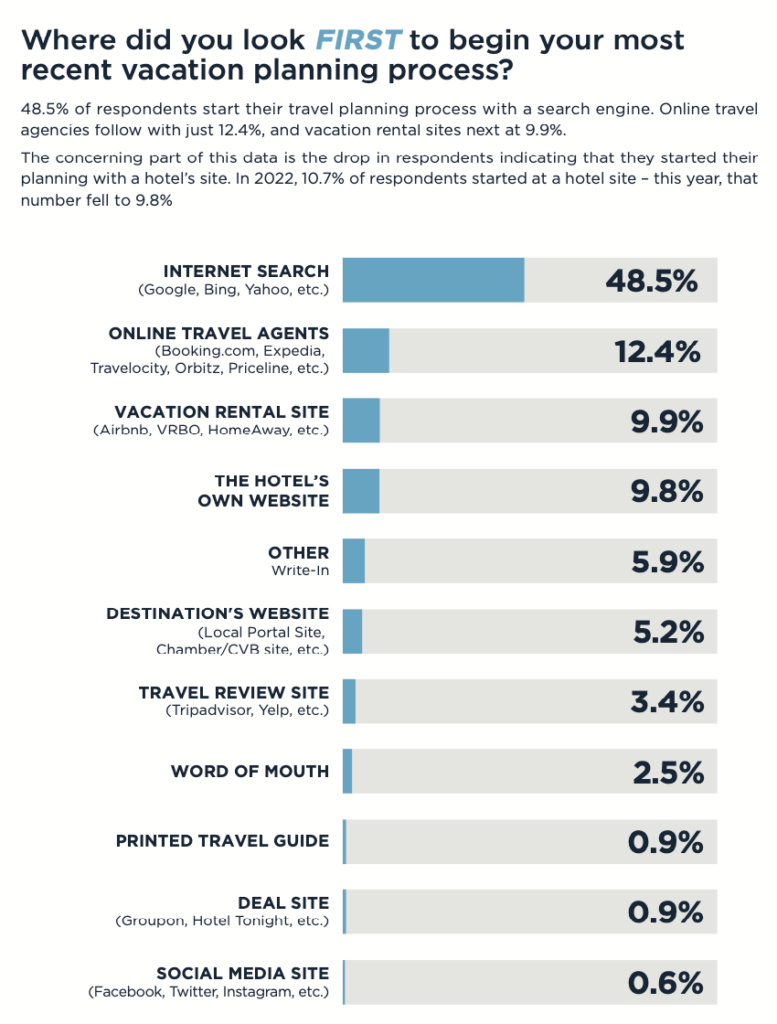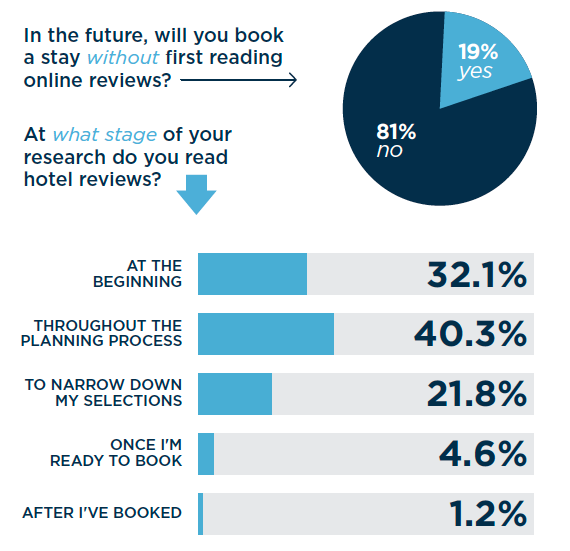These are the Review Channels Hotels Must Prioritize
by Leanne deMaille
Chances are, anything new you’ve considered lately first crossed your radar thanks to influencer marketing. However, it may not have been courtesy of a popular influencer with mass following on social media, but thanks instead to the OGs of influencing…household names for sure, like Google and Bing.
To learn more about trending influences on travel decisions, TravelBoom’s 2023 Leisure Travel Study queried exactly where travelers initiate their vacation planning.

Not surprisingly, nearly half of respondents started their planning in the same place, so we sought to uncover more specific influences besides common internet search engines to help hoteliers determine which repositories of reviews should be their primary focus.
Where do your guests initiate travel planning?
Wherever travel inspiration first strikes, it’s likely based on social proof, opinions or reviews. Whether it be from Google, social media, an online travel agent, or even a destination or hotel website, potential guests are not just taking your word for it. They want to see, hear and read your guests’ recommendations…and worst case scenario, their warnings, too!
Most small independent or boutique properties would agree that there are too few team members or hours in the day to monitor and respond to all reviews among the plethora of online sources our study participants referenced. Prioritizing the review channels of focus requires dividing and conquering to make the overwhelming manageable.

So how do you start?
The great news is, your hotel guests themselves can offer insightful clues for where to best direct your reputation management endeavors.
When I managed at the property level, the easiest, cheapest and most effective way to find guests was to ask guests! This seems an over-simplification, but our properties trained reservationists to always ask during the booking process how the new guest learned about us.
For business travelers, we may have posed a question about “what brings you to town?” Leisure family travelers may have been asked “how did you choose our resort?” Including a field for their answers in our reservations forms and guest record was imperative since having the Front Desk confirm our guests’ “source” of influence aided our marketing department to better determine the optimal focus of our reputation management strategies.
Although many hoteliers are conditioned to automatically equate TripAdvisor with guest reviews, in 2023, there is no doubt that Google has become the hotel aggregator with the highest number of reviews. Let’s look further into optimizing guest feedback on the most popular platforms, explore other avenues for guest reviews, and consider which to prioritize for your hotel.
Which hotel review sites should you focus on?
Google:
As referenced above, Google has earned its dominance in the hotel review landscape. Great reviews and conscientious review management leads to a better-optimized Google Business Profile and enhances your hotel’s online visibility and credibility.
Encouraging guests to leave reviews on Google, and very importantly, responding to their Google reviews promptly, not only influences potential guests, but also directly impacts your hotel’s search engine rankings. In fact, the Google Travel team continues to reinforce the increasing influence of guest reviews in their SERP algorithm enhancements.
TripAdvisor:
Travel review sites like TripAdvisor have amassed an unrivaled collection of guest reviews for hotels around the world, with the platform touting one billion plus reviews during their August 2023 investors conference call.
As the go-to platform for travelers to judge the credibility and customer service of your hotel based on the experiences of their fellow visitors, properties should claim and routinely optimize their TripAdvisor profiles. As with all prioritized review sites, diligently and quickly respond to both positive and negative feedback on TripAdvisor.
A decade ago, client experience expert Teresa Trevino determined the three primary types of responses to most online hotel reviews, and lots of science since illustrates that hoteliers demonstrating gratitude for the opportunity to improve routinely convert negative reviewers into hotel advocates!
Social Media Platforms:
Instagram, Facebook, Twitter, and even emerging social media platforms like TikTok allow travelers to share their experiences in real-time, making social proof a more powerful tool for influencing travel decisions than ever before. Actively and promptly acknowledging and engaging with your guests on their preferred social media, and encouraging them to share their stories, photos, and videos, provides invaluable user-generated content.
With many would-be travelers questioning the legitimacy of both good and bad online reviews, social media posts are generally perceived as more authentic, and also help create a sense of belonging to your hotel’s community.
Research from the Digital Marketing Institute introduces another consideration: Engaging with influential guests on social media platforms can actually help your hotel attract better guests!
Online Travel Agencies (OTAs):
In our 2023 Leisure Travel Study, behind internet search engines, the second-most referenced vacation planning influence continues to be Online Travel Agents. Even if it’s not your property’s preference to collaborate with OTAs like Booking.com and Expedia, for consistency, you cannot afford to overlook owning your guest reviews on the OTA platforms.
Hotels would do well to take a cue from OTA platforms that feature guest reviews and ratings prominently alongside hotel amenities and rates. For this reason alone, hoteliers should actively manage and keep their OTA listings and responses to reviews up-to-date. Even thoughtful responses to negative feedback from guests can demonstrate your hotel’s dedication to guest satisfaction on platforms where the OTAs otherwise own your hotel’s image.
Destination and Demographic-Specific Review Sites:
Depending on the target travelers to your hotel and destination, there might be niche-specific review sites you can’t afford to ignore. For instance, if your hotel caters to particular subsets of travelers, reviews on specialty sites might be relevant, like autismtravel.com for families with a loved one on the spectrum, or gadventures.com for solo travelers.
Especially with increasing curiosity about Microsoft-backed ChatGPT, some people do prefer searching with Bing. If it routinely appears as a source of reservations for your hotel, be sure you know about and manage the reviews potential guests will find on Bing as well.
Location-specific platforms could also be relevant review sites for your hotel’s focus, such as Trivago’s dominance with European travelers. For hotels in primarily fly-to destinations, the likelihood increases that your guests read reviews on sites like Skyscanner. Identifying and engaging with such niche travel sites can help hotels connect with more of their ideal guests and receive specialized feedback.
Your Hotel’s Website:
Yes, we saved the best review site for last. No matter where else potential guests find reviews for your hotel, your website should be the preeminent source of guest information, feedback and engagement.
A user-friendly review submission system allowing guests to easily share their experience is essential, and timely responses to guest reviews reinforces your attentive customer service. Featuring guest reactions on hotel websites in an attractive format creates a positive impression for potential guests still making their travel plans.
For lean staffs and hoteliers short on time, several popular reputation management platforms, including Revinate and Medallia, can supplement your team’s efforts with automated post-stay guest surveys to boost the power of your website’s guest reviews. Remember, fear of missing out is also a huge motivator, so social proof supported by services like Flip.to help guests picture themselves enjoying your hotel’s can’t miss experiences!

Additional tips for garnering more positive reviews
- Ask for reviews: Don’t be afraid to ask your guests to leave a review. If you miss the chance to personally invite their review at the end of their stay, use automation to send them a follow-up email asking for their feedback.
- Offer incentives for reviews: You don’t want to create doubts about the validity of your guest reviews, so be careful with this one. Offering your guests incentives to leave a review, such as a drawing from all guests who submit feedback for a monthly giveaway, can be the extra impetus to encourage them to take the time to write a review. But most hoteliers will agree that their happiest guests are more than willing to share their feedback when made to feel that their satisfaction is your utmost concern!
- Make it easy: Most travelers are trying to take it easy, so don’t make it too challenging to post their review on your website. Likewise, be sure it’s simple for a negative reviewer to amend or update their review after you’ve had a chance to respond and rectify their misgivings.
Remember, a proactive approach to online reviews, on the platforms where your guests are sharing their experiences, is essential to enhance your hotel’s reputation, attract more guests, and ultimately drive more direct bookings and revenue. For additional information on crafting the perfect guest review responses and where, please visit our social proof blog from earlier this year, Reputation Management for Hotels. And don’t forget to request your free download of TravelBoom’s 2023 Leisure Travel Study.